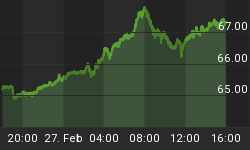This time last week, I was at the Cambridge House World Resource Investment Conference in Vancouver, BC. Usually the show is quite hopping, but this time, while there was the usual mob and there was standing room only at several of the events Doug, the Casey crew, and I participated in, the mood was decidedly low-key.
But here's the interesting part: it was low-key, but not depressed.
In fact, with metals and related stocks having just had a particularly vicious few months in the markets, I was half-expecting an angry confrontation with a soon to be ex-subscriber... maybe more. But that didn't happen. People were quietly coming up to me and asking, "So, what are you buying?"
I subsequently heard from one subscriber who had followed our published advice to average down and after the June-first surge in gold, was overall in the black. This is no mean feat during a bearish turn of the market, but not really surprising when someone buys value when it's on sale.
Back at the show, I polled my workshop audience, as I often do. This was almost the last session of the last day of the conference. From out over the show floor, I could hear the sounds of the company promoters tearing down their booths. And yet, the hall filled to capacity, and there were people standing in the hallway outside by the end of my presentation. These were serious investors.
When I asked them how many were worried about gold's recent negative price movements, I was not surprised that only a handful put their hands up. When I asked them how many were excited by the opportunity, about three times as many put their hands up. That means most were unsure what to think, which is always the case, but I was pleased to see that there was a significant presence of people at the show who viewed the low energy level as a buying signal.
People brave enough to buy when others are not interested know the secret of how to "buy low and sell high" – they are true contrarians.
I know such people exist. I work with them every day here at Casey Research. But it's precisely because such investors are rare that contrarian investing is possible.
Quick reminder: to be a contrarian does not simply mean to do the opposite of what everyone else is doing. There can be wisdom in crowds – in a way, a market price is a distillation of mass judgment. And a broken clock can be right twice a day. No; it's not just about being ornery. A contrarian is a person who analyzes markets, finds trends she or he regards as very solid – solid enough to put financial weight on – and invests accordingly regardless of what others think, say, or do.
To maximize returns doing this, a speculator picks items that people must have, such as meat, oil, copper – and, yes, gold – when they are in relative disfavor and it's a buyers' market, then liquidates the positions when everyone else is jumping in with both feet and it's a sellers' market.
So, when a good chunk of my audience told me they were excited by the correction in the metals markets, and when individuals came up to ask about what we recommend buying, I was very pleased.
And I suppose it was actually a good thing that not everyone was a contrarian – or contrarianism would cease to be contrarian, and the profit would go out of it.
Fortunately, it's not easy to buy when the market is bearish and everyone is giving you 101 reasons why things can only get worse. Perversely, it's even harder to sell when everyone else is buying and congratulating you on how smart you were to lead the way to such a profitable investment strategy. Both take genuine courage and independent thought, neither of which are common traits.
I'm not worried.
But I am buying, on days like last Thursday, June 7 – when more fearful investors will hit the bid at stupid-cheap price levels.
I hope you are too, in whatever sectors you are investing in.
It's a great idea to buy physical gold and silver when the price dips, as has been happening recently. However, there are other ways to play this market that offer outsized gains – if you're brave enough to get in on them.















